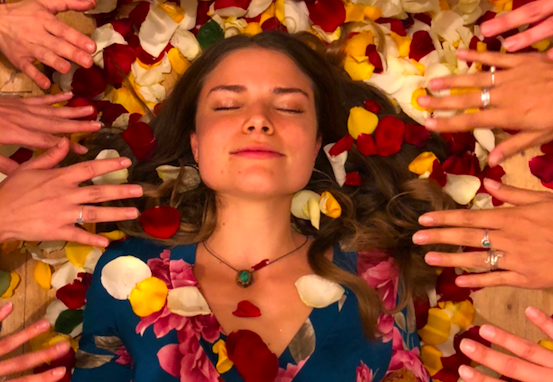Demonic, shape-shifting neon circus clowns swirled around me, laughing derisively, telling me that if I wanted to know the truth about the universe, I would have to lose everything I love, I would have to die.
I was in my first plant medicine ceremony in Peru. I was deep in another world—another dimension—I did not yet understand. And I needed help.
I felt like the clowns were inside of me, like I was viscerally experiencing the personified fears that live within me. I knew that I had to purge these fears—get their poison out of my system—but I had no idea how.
The more I tried to change my experience, the more intense it got.
“You can’t ask for help. They’ll think you’re weak. No one else is asking for help. You should be able to handle this on your own,” I told myself, while writhing in misery.
So I moaned and whimpered and writhed, but did not ask for help. The thought that others would hear how much pain I was in made me feel less alone. But it didn’t help me progress out of that hellish realm I was stuck in.
After what seemed like hours of some of the greatest anguish of my life, the word came shooting out of me like an over-pressurized valve unexpectedly releasing: “help.” I surprised myself. I hadn’t intended to say it. It just came out. It was like I had remembered a long-forgotten password to a door I had spent ages trying to claw my way through.
It was not a desperate cry. It was not a command. It was a simple, matter-of-fact announcement of the fact that I needed support.
The shaman came to my side and cleared my energy field with mapacho smoke and sang Icaros (medicine songs) to me, which quickly caused me to purge. I felt that I was purging the vibration of fear out of all of the cells of my body. As if I were laboriously re-birthing myself.
Once it was out of my system, I felt that I was flying up out of my body into a realm of ecstatic oneness and profound, unshakable presence. I saw myself surrounded by a circle of angels, blindingly bright beings of light who were joyfully celebrating my coming home to myself.
I can’t remember a time when I have felt more intensely grateful to another human being than I felt to the shaman the moment that she cleared the pathway for me to rebirth myself.
I spent the rest of the night in a more sacred state of bliss than I had ever experienced. I was flooded with insights about the nature of life and my purpose. It was the most illuminating experience I had ever had.
I couldn’t believe how simple it was. That the key to going from my own personal hell to heaven was to say one simple word: help.
I spoke to the shaman the next day and she conveyed to me that far from being annoyed by my asking for help, she felt so grateful for the opportunity to show up for me. A special bond was formed between the two of us. She got to see me in my rawness and vulnerability and I got to see her in her power and receive her gifts.
After that, I became a person who asks for help. I realized in retrospect that my experience that night was an intensely exacerbated version of a long-held pattern that I had never before recognized: I was willing to suffer extreme intensity for long periods of time on my own, just so that I could say that I didn’t ask for help.
My ego wanted other people to know how much I was suffering in isolation. It did not want them to hear me ask for help.
I realized how often I have crossed my arms over my chest and turned away from my boyfriend in bed to sit alone with my own insecurities, frustrations, or jealousies rather than ask him to say the words I need to hear.
I realized how often I have allowed myself to go days feeling off-center and lonely without reaching out to the people who know exactly how to cheer me up, just so that I could be the one who they come to for help and not vice versa.
I realized how often I have given off the untruthful impression that I am wonderfully fulfilled and happy, just so that I don’t have to look bad to my relatives or peers.
I realized with great distaste how much we as humans have a proclivity to make our hurt and suffering be known to others without directly asking for help. Hoping beyond hope that they will thrust their help upon us before we have to let them know that we need it.
After that ceremony, I committed to liberally and unapologetically using the word “help.”
I have since discovered that “help” is a complete sentence.
That we don’t have to know how we need help before we can ask for it.
That the word “help” has the power to break through our stubbornness and egotism.
That it is far better to ask for help than to make a show of our misery, hoping someone notices.
That just saying the word “help” lets my heart know that I care about it more than my ego.
Sometimes, I say the word “help,” when no one else is even around. I use it to call my own presence forth to show up more fully for myself.
Now, I love saying help. It doesn’t make me feel foolish or weak. In fact, it makes me feel strong, knowing that I have the wherewithal to ask for what I need when I need it.
Now, I have no problem asking for help in, for instance, a triggering conversation with my boyfriend about his past partners when I feel the intensity of insecurities in my body. The word is his signal to stop the conversation in its tracks so that I have time to breathe and assess what I need in that moment.
I now text the word “help,” simply and succinctly, to my best friends when I’m feeling low. I have prepared them to know that this word isn’t an SOS (unless otherwise stated), it’s simply my way of cutting to the chase, getting out of my own head, and alerting someone to the fact that I’m in a funky mental space.
I no longer fear being a burden by requesting help. Those of whom I request help are clear that if they don’t have the bandwidth to help me, they can say so without fear of offending me. And, likewise, if I ever lack the capacity to give them the help they require, I will clearly say so.
We have the understanding that we will never resentfully support or hold space for each other. That if we say yes to helping the other out, it is because we truly want to, not because we feel obligated to.
I have discovered that others actually feel honored when I ask them for help, and that they feel it is a privilege (not at all a burden) to show up for me in my time of need.
My own experience verifies the psychological phenomenon called “The Ben Franklin Effect,” which explains the tendency for people to like you more when you ask them for help or favors.
I’ve found that when I ask for help when I’m feeling stuck or low, I create permission for those around me to do the same. In turn, we create a culture of shameless help-asking in which we all get to simultaneously feel so much more needed by and grateful for one another.
So I invite you to try out saying more things like this: “Can you help me see this situation from a different perspective?” “Can you tell me about the strengths you see in me? I can’t seem to see them for myself right now.” “Can you hug me and tell me everything is going to be okay?”
I invite you to often stop and ask yourself the question, “What if there is someone out there who would get joy out of supporting me right now? Who could that person be and what could I ask of them?”
I invite you to say the words, “I think I need help,” even when you think you could handle it on your own, even when you’re worried about annoying or offending someone for asking, even when you’re worried about being judged.
I invite you to use your intuition and see how precisely you can speak aloud exactly what you want and need.
I invite you to ask yourself to help yourself, ask others to help you, and ask the universe to help you.
And see what magic unfolds when you allow yourself to let go of the struggle and open yourself to what wants to make your life better and easier.
Maybe the angels who came to me that night during my ceremony always come to those who ask for help, we just normally can’t see them.
~












Read 0 comments and reply